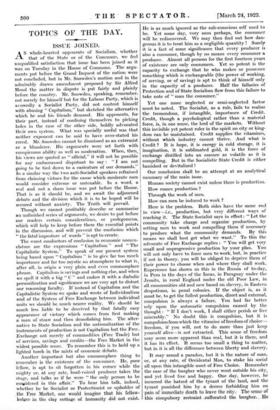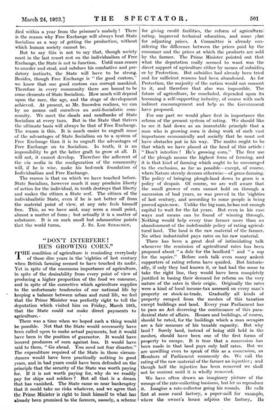TOPICS OF THE DAY.
ISSUE • JOINED.
AS whole-hearted opponents of Socialism, whether that of the State or of the Commune, we feel unqualified satisfaction that issue has been joined as it was on Tuesday in the House of Commons: The argu- ments put before the Grand Inquest of the nation were not concluded, but in Mr. Snowden's motion and in the admirably drawn amendment proposed by Sir Alfred Mond the matter in dispute is put fairly and plainly before the country. Mr. Snowden, speaking, remember, not merely for himself but for the Labour Party, which is avowedly a Socialist Party, did not content himself with abusing " Capitalism," but sketched the alternative which he and his friends demand. His opponents, for their part, instead of confining themselves to picking holes in the case of the other side, boldly advocated their own system. What was specially useful was that neither exponent can be said to have over-stated his creed. Mr. Snowden cannot be dismissed as an extremist or a blunderer. His arguments were set forth with conspicuous ability as well as moderation. When, then, his views are quoted as " official," it will not be possible for any embarrassed disputant to say : " I am not going to be tied down to a caricature of our demands." In a similar way the two anti-Socialist speakers refrained from claiming virtues for the cause which moderate men would consider extreme or untenable. In a word, a real and not a sham issue was put before the House. That is as it should be, and we await the adjourned debate and the division which it is to be hoped will be secured without anxiety. The Truth will prevail.
Though we cannot profitably describe or summarize an unfinished series of arguments, we desire to put before our readers certain considerations, or prolegomena, which will help to keep before them the essential points in the discussion, and will prevent the confusion which " the fatal imposture of words " is apt to create.
The worst conductors of confusion in economic nomen- clature arc the expressions " Capitalism " and " The Capitalistic System." To speak of our present system being based upon " Capitalism " is to give far too much importance and far too mystic an atmosphere to what is, after all, in origin a very plain and even commonplace phrase. Capitalism is savings and nothing else, and when we spell it with a big " C " and endow it with a diabolic personification and significance we are very apt to distort our reasoning faculty. If instead of Capitalism and the Capitalistic 'System we spoke and wrote of Individualism and of the System of Free Exchange between individual units we should be much nearer reality. We should be much less liable to be deceived by that fatally easy appearance of victory which comes from first making a man of straw and then demolishing him. The alter- native to State Socialism and the nationalization of the instruments of production is not Capitalism but the Free- Exchange not merely of commodities (Free Trade) but of services, savings and credits—the Free Market in the widest possible sense. To remember this is to hold up a lighted torch in the mists of economic debate.
Another important but also commonplace thing to remember is the existence Of the consumer. He, poor 'fellow, is apt to sit forgotten in his corner while the mighty or, at any rate, loud-voiced producer takes the stage, and talks as if he were " the only person to be considered in this affair." To hear him talk, indeed, whether he be Socialist or Protectionist or upholder of the Free Market, one would imagine that his fellow- lodger in the clay cottage of. humanity did• not exist.. He is as much ignored as the sub-conscious self used to be. Yet some day, very soon perhaps, the consumer will be rediscovered. We may then find out how dan- gerous it is to treat him as a negligible quantity 1 Surely it is a fact of some significance that every producer is also a consumer, though by no means every consumer a producer. Almost all persons for the first fourteen years of existence are only consumers. Yet so potent is the capacity to exchange that he who makes or .possesses something which is exchangeable (the power of working, of serving, or of saving) is apt to think of himself only in the capacity of a producer. Half the fallacies of Protection and of State Socialism flow from this failure to take note of " man the consumer."
Yet one more neglected or semi-neglected factor must be noted. The Socialist, as a rule, fails to realize the tremendous, if intangible, importance of Credit. Credit, though a psychological rather than a material force, is, in one sense, the lord of the markets. Without this invisible yet potent ruler in the spirit no city or king- dom can be maintained. Credit supplies the vitamines, without which industry cannot thrive. •And what is Credit ? It is hope, it is energy in cold storage, it is imagination, it is sublimated gold, it is the force of exchange distilled into an essence as volatile as it is compelling. But in the Socialistic State Credit is either banished or devitalized !
Our conclusion shall be an attempt at an analytical summary of the main issue.
Human society cannot exist unless there is production. . How comes production ?
Through the work of men.
How can men be induced to work ?
Here is the problem. Both sides have the same end in view—i.e., production, but very different ways of reaching it. The State Socialist says in effect : " Let the community take charge and organize production, by setting men to work and compelling them if necessary to produce what the community demands. By this means we shall best get what we want." To this the advocate of Free Exchange replies : " You will get very small and unprogressive production by your plan. You will not only have to force men to work, but, in practice if not in theory, you will be obliged to deprive them of their power to choose when and where they shall work. Experience has shown us this in the Russia of to-day, in Peru in the days of the Incas, in Paraguay under the Jesuits, in rural England under the old Poor Law, in all communities old and new based on slavery, in Eastern despotisms, in penal colonies. If the object is, as it must be, to get the fullest production, direct and external, compulsion is always a failure. You had far better rely upon the automatic compulsion caused by the thought : " If I don't work, I shall either perish or live miserably." No doubt this is compulsion, but it is compulsion from which the vitamine of freedom of choice— freedom, if you will, not to do ,more than just keep yourself alive—is not extracted., This sense of freedom may seem more apparent than real, but it is there, and it has its effect. It seems too small a thing to matter, but in it is all the difference between liberty and slavery.
It may sound a paradox, but it is the nature of man, or, at any rate, of Occidental Man, to stake his social all upon this intangible asset of Free Choice. Remember the case of the burgher who never .went outside his city, and yet lived free and happy. One day, however, he incurred the hatred of the tyrant of the land, and the tyrant punished him by . a decree forbidding him on 'pain of immediate death to leave the city. Thelsense of :this compulsory restraint .suffocated the burgher.._ Ike died within a year from the prisoner's malady ! There is the reason why Free Exchange will-always beat State Socialism as a way of getting the production, without which human society .cannot be. But to say this is not to say that, though society must in the last resort rest on the individualism of Free Exchange, the State is not to function. Until man ceases to murder and steal, and subdues his combative and pre- datory instincts, the State will have to be strong. Besides, though Free Exchange is " the good custom," we know that one good custom can corrupt mankind. Therefore in every community there are bound to be some elements of State Socialism. How much will depend upon the race, the age, and the stage of development achieved.. At present, as Mr. Snowden realizes, we can by no means call ourselves an anti-Socialistic com- munity. We meet the shoals and sandbanks of State Socialism at every turn. But in the State that thrives the ultimate basis will always be that of Free Exchange. The reason is this. It is much easier to engraft some of the advantages of State. Socialism on to a system of Free Exchange than it is to engraft the advantages of Free Exchange on to , Socialism. In truth, it is an impossibility to get the latter graft to grow at all. It will not, it cannot develop. Therefore the adherent of the via media in the configuration of the community will, if he is wise, make his bed-rock foundation of Individualism and Free Exchange.
The reason is that on which we have touched before. State Socialism, however much it may proclaim liberty of action for the individual, in truth destroys that liberty and makes the citizen a State serf. The citizen of the individualistic State, even if he is not better off from the material point of view, at any rate feels himself free. This, as we have said, may seem a small point, almost a matter of form ; but actually it is a matter of substance. It is on such small but adamantine points



































































 Previous page
Previous page